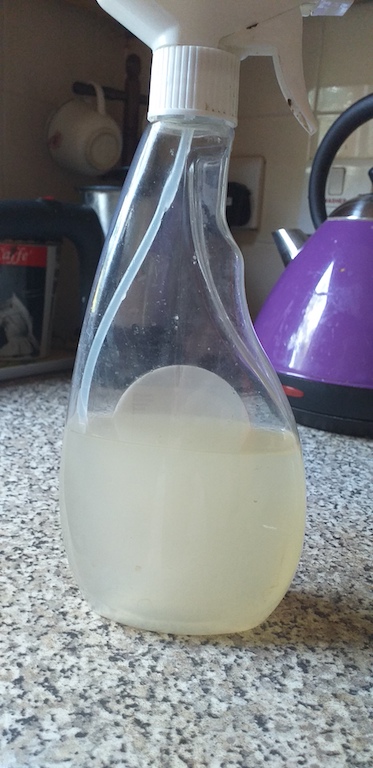I stopped using the usual shop bought chemical kitchen cleaners about fifteen years ago. Prior to finding a probiotic cleaner by the UK company, Microbz, I was using plain tap water and essential oil of lemon to clean my kitchen and bathroom. Microbz made their own 250ml protiobic cleaner, which was diluted with water to make your own kitchen cleaner, but they’ve since joined with another company and discontinued the product, so I thought “why not make my own probiotic cleaner”, so I searched online to find a recipe.
Altogether, it’s taken about six to eight weeks to make, but the batch should last me six to twelve months. I’ve already given some to friends, so I do hope that they use it because I put a lot of time and effort into eco-friendly living. Probiotic cleaners are fantastic for cleaning kitchen worktops, as they leave microbes on the surface that continue to work in killing harmful bacteria. Shop bought kitchen cleaners may be effective at killing up to 99.9 percent of bacteria, but they are often laden with strong chemicals, and don’t forget that you are breathing these chemicals in each time you use them.
This probiotic cleaner recipe is taken from Fermentacap.com. Besides the slight vinegar smell, once it’s wiped down the smell pretty much goes away. My kitchen surfaces are left with a huge lot of microbes that continue to kill harmful microbes. I love it! This is the liquid undiluted. I’ve put it in an old apple cider vinegar bottle.

Recipe and Instructions For Fermented Probiotic Cleaner from Fermentacap.com
- 1 cup lemon juice. I used lemon juice already in a bottle from the shop, not fresh. It’s very affordable.
- 1/2 cup RAW apple cider vinegar. Raw apple cider vinegar has the mother (the bits that move about in the liquid – this is the good stuff)
- 1/2 an orange
- non-chlorinated water that has NOT been sitting for weeks in a plastic container (plastics in contact with water do leach chlorides into the water, which inhibit some types of microbial growth). Freshly filtered water, or well water is best. I let tap water sit for a few hours before using.
- 1/2 gallon mason jar. I just used a standard pickle jar.
- Fermenta Lock or Fermenta Free airlock lid. I managed to find these airlock lids on eBay. I think they were £10 for 4, plus postage. They fit any standard pickle jar.
- Fermenta Cap cloth cover or other cloth cover for the jar. I used a coffee filter with an elastic band, or you could use a piece of kitchen roll.
- Blender or Food Processor
- Cut the orange into small pieces, and toss it into a blender or food processor, along with the lemon juice and vinegar. Blend until the orange is finely chopped.
- Pour out into the mason jar, and fill to the 6 cup mark with non-chlorinated water.
- Put the Airlock lid on the jar.
- Let sit for 2 weeks. You will first smell a pleasant orange smell on the airlock, and then an alcoholic orange smell. This is normal, and how it should be.
- Remove the airlock lid, and strain the liquid. Squeeze out the solids completely.
- Return the liquid to the mason jar. Add more non-chlorinated water, just to return it to the 6 cup mark.
- Place the Cloth Cap on the jar.
- Let sit for 4-8 weeks, or until all of the alcoholic smell is gone, and the smell is more orange vinegar.
- Replace the Cloth Cap at that point with a storage lid, and your cleaner is ready to use.
To use, dilute with a ratio of 1 part cleaner to 3 parts water for spray cleaner. Dilute at a 1:10 ratio for other cleaning tasks.
The good stuff, the mother, often sinks to the bottom of the bottle, so give it a good shake every time you use the probiotic cleaner. This is how it looks diluted.


